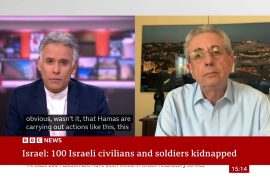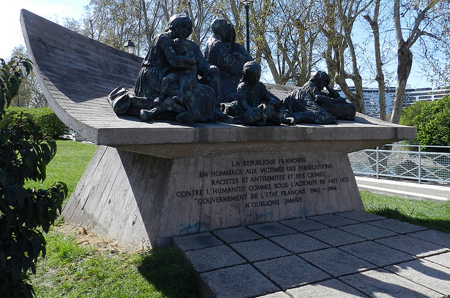Previously we discussed the first half of the September 14th edition of the BBC World Service radio programme ‘The Inquiry’ titled ‘What’s next for Palestinian leadership?’ and presented by Emily Wither:
BBC WS RADIO PRESENTATION OF THE PA SUCCESSION CONUNDRUM – PART ONE
Following the contributions from two Palestinians – an “independent journalist” and a pollster – Wither then turns to the next topic – “who could unify the political groups and gain the trust of the Palestinian people?”. Part three of the programme is titled “the top seat” and the “witness” contributor is Ahmad Khalidi who is presented by Wither as “a political analyst and writer on Palestinian and Middle East political and strategic affairs”.
BBC editorial guidelines on impartiality include a section on ‘Contributors’ Affiliations’:
“4.3.12 We should not automatically assume that contributors from other organisations (such as academics, journalists, researchers and representatives of charities and think-tanks) are unbiased. Appropriate information about their affiliations, funding and particular viewpoints should be made available to the audience, when relevant to the context.”
The affiliation of Ahmad Khalidi to the political NGO Al Shabaka is highly relevant to the topic under discussion in this programme but is not disclosed to BBC audiences, despite the fact that the production team was obviously aware of that fact. Neither are audiences informed that Khalidi was previously an advisor to both Arafat and Abbas.

Listeners hear brief and largely uninformative mentions of several potential successors to Abbas including Hussein al Sheikh (who is described only as “the PA’s go-between with Israel”), Mohammad Dahlan and Marwan Barghouti whom Wither tells listeners is “serving five life sentences in Israeli prison for his role in the second Intifada” without clarifying that he was convicted on five counts of murder.
Khalidi’s contribution includes the claim that the younger generation is “alienated from the political system that has been established in the occupied territories” and that “if you’re alienated from the established regime, you tend to take to the streets and this is effectively what’s happened.”
Khalidi attributes the fact that “young militants” belonging to Fatah are “working alongside other organisations” (which he fails to name as terrorist organisations such as Hamas and the Palestinian Islamic Jihad) to a “common purpose…to confront the occupation”.
In response to Withers’ observation that Hamas is “more popular” and could win elections, Khalidi claims that a Hamas take-over is “unlikely” and that “no-one is really going to allow Hamas to take over the West Bank” – “certainly not the Israelis” who, according to Khalidi “will move in with absolute force”. Once again listeners are not provided with the context of what has happened in the sixteen years since Hamas’ coup in the Gaza Strip and why “the Israelis” might be reluctant to tolerate another terrorist-ruled region in Judea & Samaria.
Khalidi’s main messaging relates to the “Palestinian national goal” – a topic which listeners would have been better equipped to understand had they been made aware of his affiliation with al Shabaka which (like Khalidi himself) has repeatedly promoted the ‘one-state solution’.
Khalidi: “I think that we are going to go through a long process in which we have to redefine what the Palestinian national goals are and how to achieve them. There’s no circumstance in my opinion in which there’s going to be a negotiated settlement in which the two sides agree on a) ending the conflict, b) establishing an independent Palestinian state within the 1967 borders more or less, which is the formal national goal. The issues that we’ve been thinking in the last 30 years since Oslo of a negotiated end to the conflict, that process in my opinion has come to an end.”
Avoiding informing BBC audiences that there is no such thing as “the 1967 borders” and that the 1949 armistice lines were specifically defined as not being borders and – significantly – failing to ask Khalidi what he believes is the alternative to a negotiated settlement, Wither goes on to present part four of the programme which is titled “a Palestinian state”.
The “witness” brought in to contribute to that final part of the programme is Ines Abdel Razek, executive director of an NGO called the Palestine Institute for Public Diplomacy (PIPD). Listeners are not told anything about that NGO, including its collaboration with other NGOs linked to the PFLP terrorist organisation. Neither are they informed that Abdel Razek is – like the previous contributor – affiliated with al Shabaka or that just two days before this programme was aired she was promoting her ”particular viewpoints” concerning the eradication of the Jewish state on the pages of the Qatari backed ‘Middle East Eye’. Abdel Razek’s previous employment in the PA prime minister’s office is also not mentioned.
Once again, that information would have helped listeners understand what they were about to hear, including Withers’ statement that Abdel Razek “says we can’t talk about a Palestinian state without talking about Israel”.
Abdel Razek: “We should not look at the relationship with the Israelis as a separate external sort of foreign affairs matter. All Palestinians are living under Israeli ruling. We live in a one-state reality where Israel controls Palestinian lives…”
With regard to internal Palestinian politics, listeners hear the entirely unevidenced claim that “it’s in Israel’s interest to keep the situation as it is”.
Abdel Razek: “The Israeli regime is determined to prevent any form of political organising and the PA as well.”
Abdel Razek goes on to claim that the “international community” is also complicit because it prefers to maintain the PA’s political status quo “in the name of stability instead of actually giving Palestinians their political agency and freedom”.
The Abraham Accords are portrayed by Wither as potentially having “implications for the Palestinian cause” without any clarification of what that “cause” entails. Listeners are told that the agreements normalise “the current situation in which basically the Palestinians are completely left out and marginalised” but no effort is made to inform BBC audiences that the Palestinians themselves chose to boycott the Abraham Accords.
Abdel Razek’s final contribution clarifies that what interests her is not in fact internal Palestinian politics or the everyday lives of the Palestinian people when she claims that “the only sustainable path” is for “Palestinians to be allowed to have again a renewed national representation that can challenge the occupation”.
The programme closes with Wither summing up “what’s next?”. The scenarios include “continuity” with a take-over by one of Abbas’ allies, a mention of “unlikely” elections and “more violence” leading to the collapse of the PA. Withers’ final conclusion is that in the current situation, the “prospects of statehood are even further from grasp”.
Clearly this programme did not provide BBC audiences with much information to familiarise them with any of the people who might potentially succeed Mahmoud Abbas. Instead, a twenty-three-minute programme supposedly purporting to give an answer to the question of “what’s next for Palestinian leadership?” put far more focus on issues other than internal Palestinian politics, including Israel (although without even one Israeli contributor) and the ‘peace process’, while making no serious effort to objectively inform listeners on the obviously relevant topic of why that process has failed to date and the connection between that and the “prospects of statehood” for Palestinians.
In fact, the main purpose of this production appears to be consistent with the BBC policy in recent years of providing a platform from which inadequately presented ‘one-staters’ can mainstream their idea of a ‘solution’ to the conflict while failing to clarify that what they advocate is in fact the demise of the Jewish state.
Related Articles:
BBC R4, WS MARK ISRAELI INDEPENDENCE WITH ‘NAKBA’ AND ‘ONE-STATE’
BBC AGAIN MAINSTREAMS ‘ONE-STATE’ WITHOUT AN EXPLANATION
YOLANDE KNELL TIES ONE-STATE BANNER TO BBC MAST
ONE-STATERS GET BBC WS PLATFORM FOR PROMOTION OF BDS, ‘RESISTANCE’ AND ‘APARTHEID’ TROPE
BBC NEWS PROMOTES ‘ONE-STATE’ STEPPING STONE AND POLITICAL MESSAGING
BBC’S HARDTALK PLATFORMS A ONE-STATER’S DISTORTIONS AND SMEARS – PART TWO




